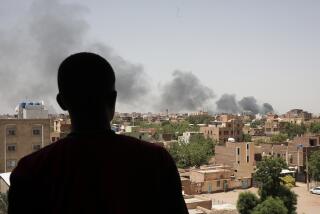Tensions over deaths of Iraqi civilian forces
- Share via
BAGHDAD — The target was in the house. U.S. forces made their move. But as they neared the building in a lush farming area south of Baghdad, gunmen emerged from the dark.
When the shooting ended, two U.S.-allied civilian security guards were dead, along with a companion apparently linked to the security force.
The U.S. Army said Sunday it appeared that the Iraqi men had left their assigned checkpoint in the village of Jarf Sakhr and were mistaken for insurgents.
But it was the second case in a week of U.S. forces killing civilian fighters in the area, and the third such incident this month in Iraq, where the security force’s cooperation with American and Iraqi troops is considered key to maintaining recent security gains.
Since the latest shooting, some of the guards, who are known as Sons of Iraq, have abandoned their checkpoints to protest what they consider careless U.S. behavior. The U.S. military pays the security volunteers, formerly known as concerned local citizens or Awakening Councils, about $10 a day to maintain security in their neighborhoods.
Col. Tom James of the U.S. Army’s 4th Brigade, 3rd Infantry Division said the Friday shooting could have been avoided had the civilian fighters followed rules outlined in contracts they sign with the military. Those rules include remaining at checkpoints and not taking offensive action, which could cause soldiers to mistake them for insurgents, he said.
“We’re very strict in our approach to the Sons of Iraq, what they can and cannot do, how they have to be in their positions and be static,” he said. “A situation like this occurs because they are not following those particular rules.”
But his description of the event Friday also underscored the difficulty of conducting missions in volatile regions with a mix of uniformed and non-uniformed forces that operate in close proximity but do not communicate with one another.
Sons of Iraq members are not in direct contact with American forces and are not told beforehand of planned operations. That means if they see figures moving in the distance in the night, they have no way to know whether they are friend or foe until they get close to their checkpoints.
With attacks on their checkpoints increasing dramatically since Al Qaeda leader Osama bin Laden condemned the Iraqi volunteers in a December statement, leaders say they have reason to be edgy.
The U.S. military, meanwhile, says its forces have no choice but to fire if they perceive a threat or come under fire.
“It’s a very, very complex environment out there,” said Navy Rear Adm. Greg Smith, a military spokesman. He cited the proximity of operations to some civilian checkpoints, the suspected infiltration by insurgents of some volunteer units, and the confusion that occurs when shots ring out in the dark.
“In some instances it turned out there were” security guards shooting, Smith said. “What’s unknown to us is precisely what they thought they were shooting at.
“Without appointing blame or suggesting that we’re always in the right, we certainly conduct our operations to be as precise as we can,” he added.
James said the U.S. forces Friday had tracked a suspected Al Qaeda in Iraq insurgent to the house about 550 yards from a Sons of Iraq checkpoint. He said the troops were moving toward the house to arrest the suspect when they encountered three gunmen.
After the gun battle, the Americans continued toward the house, where they captured two suspected insurgents. Only later did they learn that two of the men killed were registered Sons of Iraq members who had been approved for security work after passing U.S. background checks, James said. The third was a friend of a local sheik who oversees the Sons of Iraq program in the area.
James said an investigation still was underway into another shooting in the same area early Thursday, which left nine Iraqis dead. He said some of them were Sons of Iraq members, but he did not know how many.
On Feb. 2, four men and two women were killed in northern Iraq by U.S. troops, and Smith confirmed Sunday that they included some Sons of Iraq members. He also said that of 12 people held in the same incident, nine were found to be Sons of Iraq members and freed.
Smith said that in some cases, it was possible that insurgents had infiltrated the security units and used their positions within to attack U.S. forces. But leaders of the groups say this would be rare because of the vetting by both tribal leaders and U.S. troops, who conduct biometric screening and security background checks.
“We have more than 8,000 fighters. We know their tribes, who is present here, and it is impossible that we would have Al Qaeda infiltration because we don’t bring in people from outside the area,” said Mohammed Ghrairi, a tribal leader in northern Babil province, where the two shootings last week occurred.
Ghrairi said the mistakes happened not because his forces had left their posts, but because U.S. troops from outside the area crossed into the region during missions and were not familiar with the Sons of Iraq positions there.
A tribal leader in northern Iraq, who requested anonymity for security reasons, also denied that infiltration was a major problem. “The chosen [security] elements are cosponsored by the tribal chieftain,” he said. “Some of the elements are infiltrated and have allegiance to armed groups, but it’s not common.”
--
Special correspondents in Hillah, Kirkuk and Baghdad contributed to this report.
More to Read
Sign up for Essential California
The most important California stories and recommendations in your inbox every morning.
You may occasionally receive promotional content from the Los Angeles Times.














